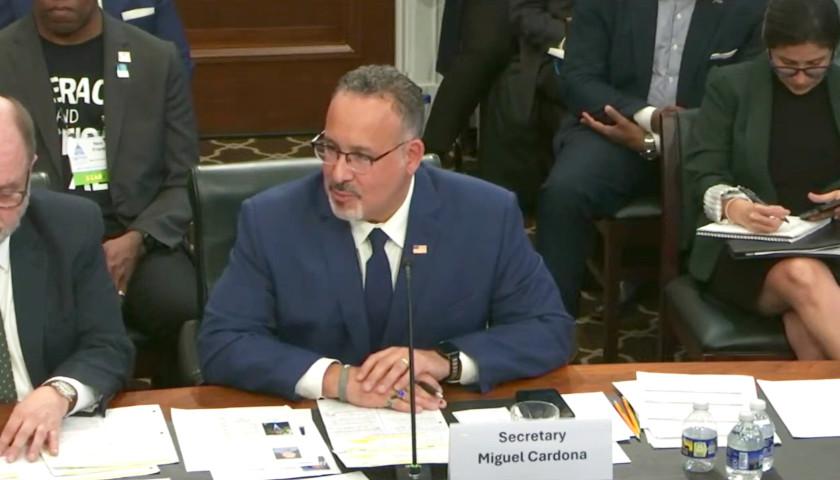Republican candidate for Connecticut governor Bob Stefanowski pledged last week to cease collection of the hundreds of licensing and regulatory fees small businesses and entrepreneurs are forced to pay prior to their repeal by the next legislature.
“Now I know everybody’s gonna jump up and down, you can’t do that, OK,” Stefanowski said Tuesday, according to CT Mirror. “I’m going to tell [the tax commissioner] to do it.”
CT’s next LG, @ldevlinct, and I pledge to cut 200 state taxes on our first day in office. These fees are crushing CT businesses, workers, and families and are making our state too complicated.
CT, it’s time for change. pic.twitter.com/QSGrFMaz2N
— Bob Stefanowski (@bobforgovernor) August 30, 2022
Stefanowski cited recent research by the Yankee Institute that showed the state imposes about 200 taxes and regulatory/licensing fees that together create $50 million in state revenue.
Yankee Institute President Carol Platt Liebau wrote in her introduction to the analysis the data include “all the taxes and fees Connecticut collects, some fees taking in as little as $10.”
Liebau continued:
The bottom 200 sources of revenue amount to only 0.22% of Connecticut’s total revenue. For those who pay these fees, though, they can constitute a significant burden — although a $100 licensing fee is a mere drop in the bucket for Connecticut revenues, it may be a substantial expense for a new hairdresser struggling to get her first business off the ground.
Stefanowski emphasized the regulatory and licensure fees are yet another tax on small businesses that are unable to sustain the costs of staying open in the heavily-taxed state.
In June, DataCore Partners economist Donald Klepper-Smith also told CT Post that “when it comes to Connecticut, businesses are being incentivized to look elsewhere.”
“Economic development these days speaks to cost structures,” he said. “Forty percent of your long-term job growth is a function of the cost of doing business.”
Stefanowski continued to make one of the central points of his campaign, that, under the leadership of Democrats like current Governor Ned Lamont, small businesses are suffering in Connecticut:
You look at a small business that’s come into Connecticut. Look at a small LLC. They’re bringing jobs to Connecticut. Why should we charge them for bringing jobs? Why should we be nickel-and-diming people for … 1% of the surplus that we have right now?
The GOP candidate said Lamont “overtaxes his people by $5 billion,” a reference to the “budget surpluses” of the last fiscal year.
“That’s the amount of money sitting up here that he doesn’t need,” Stefanowski pressed. “And then he selectively hands it back to the people that he wants to, and he looks like a hero.”
In addition to ensuring anyone who wants a good paying job can get one, we're supporting working folks by:
💸 Boosting the minimum wage to one of the highest in the US
✅ Increasing the Earned Income Tax Credit, which puts more money in working people's pockets come tax season pic.twitter.com/ATxg7Hpm2Z— Governor Ned Lamont (@GovNedLamont) September 5, 2022
During his campaign, Lamont is painting himself as a governor who provided “tax relief” to Connecticut citizens.
Lamont campaign spokeswoman Onotse Omoyeni responded, according to CT Mirror:
Today Bob Stefanowski launched the latest attempt to reset his flailing campaign with a message that shows he still doesn’t have a legitimate policy proposal. Stefanowski’s antics — summoning cameras to propose $50 million in savings after his running mate voted against $650 million in tax cuts for working people — prove he’s not serious about leading the state.
CT Mirror, however, clarified Lamont’s “tax relief plan”:
The $660 million tax relief plan the governor approved this year is one of the largest in state history. But more than half of the relief is one-time in nature. And state financial aid programs designed to help front-line workers who faced COVID-19 exposure have struggled, either due to a complicated application process or a lack of funding.
Similarly, Hartford Mayor Luke Bronin (D) defended Lamont against Stefanowski’s claim Connecticut small businesses and entrepreneurs are being targeted not only with taxes, but also regulatory and licensure fees.
Bronin dismissed Stefanowski’s plan “as small-ball, and a search for a message after shaking up his campaign staff,” a reference to the GOP candidate’s choice of grassroots organizer and firefighter Patrick Sasser as his new campaign manager.
“He needed a reset, and he didn’t get one today,” Bronin said. “Instead, what he proposed was nickels and dimes, you know, a tax cut that amounts to 1/13 of the tax cut that the governor just enacted.”
In March 2001, the Connecticut Office of Legislative Research (OLR) was asked to review “the license renewal fees for various professions before they were raised in conjunction with a tax increase.”
OLR was also asked, at the time, for “a comparison of Connecticut’s current renewal fees for these professions with the renewal fees in other states,” research analyst Paul Frisman wrote in his report.
OLR’s summary is as follows, noting especially, “Connecticut’s fees exceed those of nearly every state included in this report”:
Before they were raised in 1989, and again in 1992, annual license renewal fees for the 15 professions covered in this report ranged from $25 for a psychologist to $160 for a physician. Today [2001] the renewal fee for both these professions is $450. The percentage increase of renewal fees varies widely. Many fees have tripled, while the annual renewal fee for psychologists increased by a factor of 18 (from $25 to $450).
We compared the current Connecticut renewal fees to the 1999 renewal fees (the last date for which fees were readily available) in 14 randomly selected states. Connecticut’s fees exceed those of nearly every state included in this report. If you would like us to compare the current fees of specific professionals in a selected number of states, please let us know.
Since 2001, the annual licensure fee for physicians and psychologists in Connecticut was raised again and is now $570.
– – –
Susan Berry, PhD, is national education editor at The Star News Network. Email tips to [email protected].
Photo “Bob Stefanowski” by Bob Stefanowski. Background Photo “Willimantic, Connecticut” by JJBers. CC BY 2.0.








